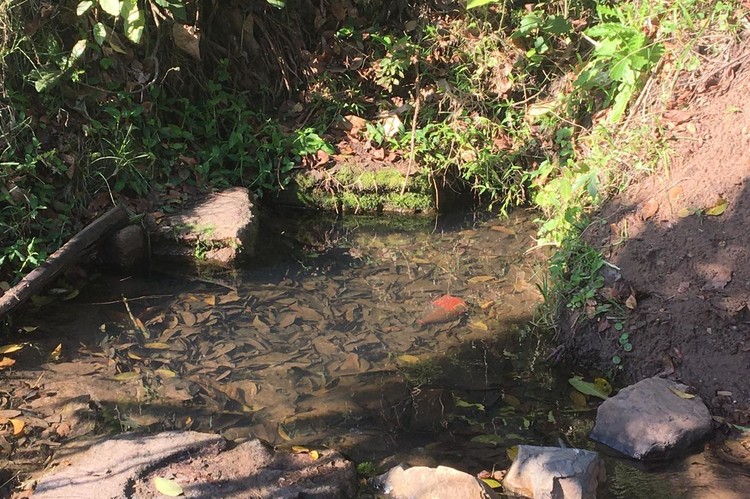
26 August 2024
One of the streams from which people in Mandeni Local Municipality in KwaZulu-Natal collect water when the water truck fails to arrive. Photo: Nokulunga Majola
Communal standpipes used to supply water to about 1,000 households in the Mandeni Local Municipality near Stanger in KwaZulu-Natal, but these dried up more than ten years ago, with water now being provided by unreliable water trucks.
When the trucks to not deliver water, residents in the sprawling semi-rural area covering wards 1, 2, and 8 in the north-eastern part of the municipality, have to get water from nearby streams which are also used by livestock.
Thalente Sibiya said in her area there used to be standpipes, but these can no longer be found in the overgrowth as they haven’t been used for more than ten years.
Sibiya said now they have to rely on water trucks which are supposed to come every second week on a Monday. She said households place their containers at certain points and the truck fills them up, but sometimes the trucks don’t arrive and then residents hear that the truck broke down.
She said then they either have to pay people to collect water or get it from a stream and boil it before use.
Bheki Mthembu is one of the people who collect water for neighbours from the Dokodweni toll booth about 30km away. He said he can carry 1,000 litres on the back of his bakkie, for which he charges R200.
“I saw that there was a need for water, so when people ask me to provide it, I do. The water
tanker comes maybe once a week, and sometimes only once every two or three weeks
because the area is big, and one water tanker supplies the whole ward,” said Mthembu. He said sometimes the water truck ran out of water before it filled everyone’s containers.
Ward 1 councillor Mlungisi Shelembe said only one water tanker provided water for his ward, which consisted of five sections. Shelembe said a borehole project was initiated in April, but remained incomplete, and plans to install two more boreholes were moving slowly.
He said the ward covered a large area and it sometimes took two to three weeks for each household to be serviced by the water truck.
He said the mayor of the Ilembe District Municipality in which the Mandeni Local Municipality is situated, had promised to increase the number of water trucks, but any improvements seemed to be short-lived, and some areas still went without water for an entire month.
He urged people to be patient and said he was doing his best to address the situation.
The Ilembe District Municipality operations manager for Mandeni, Xolelwa Mazibuko said recently, three of eight water trucks had broken down, but the district municipality had hired four extra trucks to supply water while the three were being repaired. The extra one was to deal with backlogs.
Mazibuko said there were plans to have a standpipe in each household’s yard, supplying water from the Sundumbili Water Treatment Works. But Mazibuko said the installation of the piping was still underway, with some of the work in the planning stage. Phase 5C of the R500-million Macambini Water Scheme was launched by the provincial Department of Cooperative Governance and Traditional Affairs (Cogta) and was expected to be completed by March next year.
She said the project has been in development since 2004, with the first phase breaking ground in 2010. Another four phases are in the planning stage, awaiting further budget allocation. So far, approximately 172km of piping and 10-million litres of reservoir storage had been completed, providing standpipes to 497 households.
Asked why the old water reticulation infrastructure was not repaired, she said it provided water bought from neighbouring King Cetshwayo District Municipality, but they were no longer able to supply water due to increasing demand on their side.
Additionally, that infrastructure was designed for communal standpipes, whereas Ilembe was connecting to every yard.